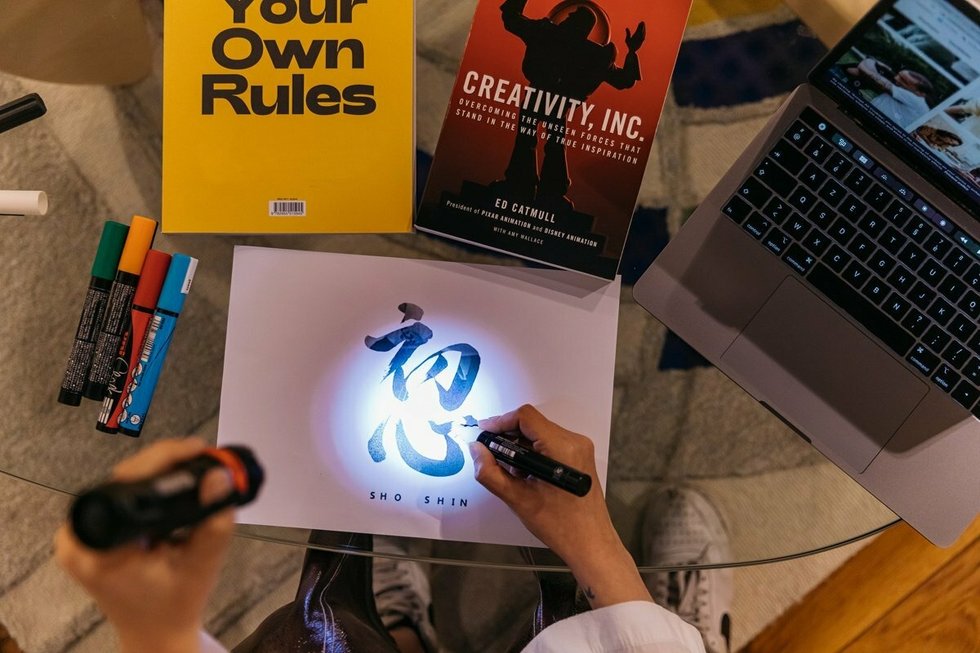Shoshin and the power of being an eternal beginner in the workplace
30 nov. 2021
5min


Journaliste
Zen Buddhism is based on “shoshin,” which translates as the “beginner’s mind.” According to this age-old concept, adopting the stance of a lifelong newbie is the best way to advance and evolve. Often used in the study of spirituality and Japanese martial arts, shoshin can also be applied to your professional life.
Shoshin. Even for those who don’t speak Japanese, this Zen Buddhist concept seems to slide off the tongue with little effort. The two kanji characters that make it up are 初 or “beginning stages” and 心 or “heart,” in both spiritual and physical terms. Typically used to denote an original intent or beginner’s resolve, the word “shoshin” can therefore be read as “first heart.” This intense feeling, somewhere between near susceptibility and unbridled enthusiasm, can come up when you take your first foreign-language course or when you’re nervous about a new relationship. But it can also describe how you feel when you embark upon your professional career.
Maybe you remember your internship. You were probably terrified but eager to learn, a giddy child among seasoned pros who had been at the company for years. Back then, your “professional heart” was most likely still humble and honest. Over the years, your career took off and developed. Now, nothing surprises you anymore. You always know what to do and when to do it. What’s more, you find the awkward interns slightly annoying. Some might say you’re good, while others claim you’ve lost your shoshin. Just like those old-timers you came up against as an intern, you’ve stopped learning. Intellectually and professionally, you’re at a standstill. But fortunately for you, you can get your shoshin back.
Silicon Valley’s magic formula?
French Buddhist Olivier Wang-Genh, master at the Ryumon Ji temple in Alsace, has been practising shoshin since the 1970s. “We call it the beginner’s mind,” he says. “It’s central. As every moment is new, our whole life and our relationship to the world are enshrined in this newness. That’s why we must always discover things and act in the present as if we were doing everything for the first time. And that’s exactly what we’re doing, for each moment is unique and will never exist again.” For Zen Buddhists, ignoring this impermanence leads to habits and prejudices. “There are so many things that make us forget that life is right here, not in the past or future,” says Wang-Genh.
The first way shoshin can be used in the workplace is to embrace your eternal beginner and put all failures to good advantage. Everyone makes mistakes. But when it happens to seasoned professionals or experts, they feel guilty because they are normally so self-assured. Beginners, on the other hand, will continually question their behavior to ensure they don’t make the same mistakes twice. Practising shoshin can help your mind stay young, lively and flexible. It thus wards off one of the biggest obstacles to learning: the ego, which is so easily flattered by the accolades and successes experienced over the course of your career.
Warren Berger is an American journalist and speaker. He specializes in the secrets behind today’s most creative companies and public figures. According to Berger, practising shoshin in the workplace is simple. Once a week, alone or preferably with a few colleagues, you can “apply the principles of shoshin to your operations or industry practices. During these sessions, try to see things with a fresh – almost foreign – pair of eyes. Ask very basic questions such as ‘What?’ and ‘Why?’ Be open to all possibilities, even the most uncommon.” Over time, he says, the beginner’s mind will develop until it becomes second nature.
Being a perpetual beginner allows you to be open and lively while remaining careful and humble. All of these qualities are highly valued in the workplace. Biographers looking to explain the genius of Steve Jobs often point out his dedication to Zen Buddhism. According to legend, his designs were inspired by core Zen practices and ideals, including selflessness and meditation. In his book Creativity, Inc., Ed Catmull, co-founder of Pixar, even presents shoshin as an excellent way to deal with the randomness of the creative process. But how did a concept that advocates stillness and humility become an integral part of the super-competitive Silicon Valley?
Your position as a manager and your past successes are no guarantee that you will solve a new problem or outdo an ambitious competitor. Those who think they know everything – so have nothing left to learn – are extremely vulnerable. The beginner’s mind can save you from falling into this trap.
Innovation and constant struggle
California’s titans of capitalism have been singing the praises of Zen Buddhism for decades. So shoshin is obviously fashionable in Silicon Valley. According to Berger: “This way of thinking is popular because it’s viewed as a source of potential innovation. Innovation often comes from a fresh look at a familiar problem. Viewing something from a different perspective often helps you see possibilities and solutions that others may have overlooked.” In other words, you might create that one killer product to become rich, famous and powerful – qualities that Buddhist monks don’t normally aspire to. But shoshin doesn’t just help with creation. It’s also a great battle companion.
An integral part of the philosophies behind many martial arts, shoshin promotes the practice of lifelong learning. In the late 2010s, a few cunning fighters revolutionized the basics of Brazilian jiu-jitsu. “It focused heavily on the leg locking system,” said author Alvin Ang, “and world-class black belts were getting destroyed because they didn’t know how to defend themselves.” With their countless medals and titles, they’d made the critical error of thinking they had nothing left to learn. This could easily apply to the business world. A hard-won management role and a score of past successes are no guarantee you will solve a new problem or outdo an ambitious competitor. Those who think they know everything – so have nothing left to learn – are extremely vulnerable. The beginner’s mind can save you from falling into this trap.
Another way that shoshin can be used in the workplace relates to keeping a level head about your achievements. You can’t be your own judge. No matter how developed your talents may seem, they will always be undermined by the biases and flaws that escape your notice. Practising shoshin helps you remember this weak spot. And as a result, it will be easier to stay humble, competitive and eager to learn.
Some may feel discomfort at the very idea of using the principles of Zen Buddhism as a weapon for career advancement. However, according to Wang-Genh: “Some people start to practise meditation to combat migraines, to sleep better, or improve their concentration to become more efficient and earn more money. Why not? The initial motivation is what it is. It’s neither good nor bad.” For the Zen master, practice will take care of the rest. “It naturally leads to discovering that your initial motivations were limited, selfish or narcissistic. And it naturally leads to overcoming them.” So, let careerism be the reason you go to the temple – but stay for the pleasure of true Zen, with all its selflessness and generosity.
Translated by Andrea Schwam
Photo by Welcome to the Jungle
Follow Welcome to the Jungle on Facebook on LinkedIn and on Instagram and subscribe to our newsletter to get our latest articles every day!

Inspirez-vous davantage sur : Construire sa carrière

Is a master's degree still worth it?
During a perfect storm of soaring tuition costs, automation and novel ways of online learning, is a master's degree still worthwhile?
23 mars 2023

Contextual intelligence: the skill that allows you to make better decisions
Adapting and understanding change is an important skill to advance your career. Here's how you can improve your decision-making skills.
31 août 2022

How to prepare for a performance review
Whether you're looking for a promotion or some extra support, solid groundwork and preparation are key to a successful performance review.
02 juin 2022

"I quit!" Three workers share their stories
Quitting can be stressful in life; the uncertainty for what the future holds can be intimidating. Here are three stories ending in liberation.
16 mars 2022

Do you really need to get out of your comfort zone?
With the help of one of our experts, Mackenzie Childs, an organizational psychologist, cognitive behavioral coach and founder of Blink...
08 févr. 2022
La newsletter qui fait le taf
Envie de ne louper aucun de nos articles ? Une fois par semaine, des histoires, des jobs et des conseils dans votre boite mail.

Vous êtes à la recherche d’une nouvelle opportunité ?
Plus de 200 000 candidats ont trouvé un emploi sur Welcome to the Jungle.
Explorer les jobs